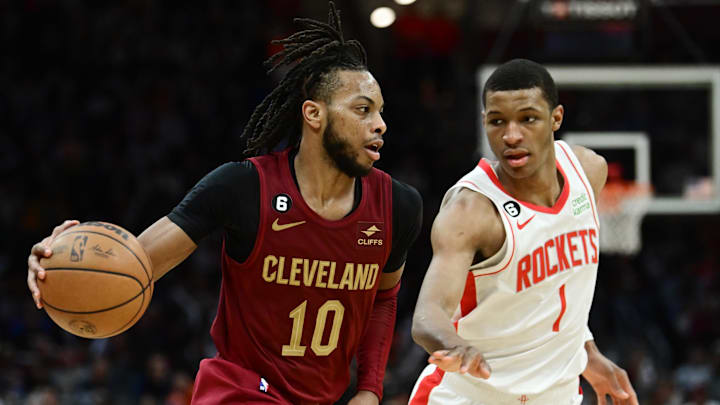How the Cleveland Cavaliers approach this offseason will hold massive consequences for the organization's future no matter what they do.
If the Cavaliers repeat last summer and stand pat, they will be one of the first franchises to endure the harsh penalties of the new second apron. The Cavs will be at risk of a frozen first-round pick seven years into the future, and their trade opportunities will be almost entirely restricted. With just another embarrassing second-round exit this postseason, it is difficult to imagine the Cavaliers can stay competitive in the new financial environment of the NBA.
With Evan Mobley and Donovan Mitchell named to this year's All-NBA list, they appear to be safe from any trade rumors and are viewed as untouchable. Jarrett Allen and Darius Garland, however, are again subjects of countless rumor mill stories. Given Garland's position as a two-time All-Star and expert facilitator and shooter, rival teams are certain to show interest in acquiring Cleveland's homegrown star. While his toe surgery will sideline him until training camp, the Cavs are still reportedly fielding calls about his availability.
Trading Garland is a complicated and messy task. The Cavs are an expensive roster and cannot stack salaries in a trade to get any deal done unless it takes them below the second apron or they can complete the trade with multiple transactions instead. Additionally, trading Garland is only a worthwhile endeavor if Cleveland stays a legitimate contender and sheds enough salary to gain actual flexibility. This means a multi-team trade is necessary.
The Houston Rockets should be calling about Garland
If the Houston Rockets miss out on the Kevin Durant sweepstakes, Garland would be an ideal star target in a pivot move. The Rockets have a $44 million team option on Fred VanVleet this summer, and if they move on from him and acquire Garland's $39 million, they can not only improve their own financial situation but also find a younger and more dynamic backcourt star.
Looping in the Chicago Bulls, the Cavaliers swap Darius Garland for a wealth of valuable assets, albeit not the draft compensation that the Memphis Grizzlies received for non-All-Star Desmond Bane. Instead, the Cavs prioritize proven talent, and Jabari Smith, Jr. presents a long-term potential star next to Mobley in the frontcourt.
Additionally, Cleveland reroutes Isaac Okoro to the Chicago Bulls via Chicago's Non-Taxpayer Mid-Level Exception, making use of the new rule that allows an MLE to be used as a trade exception. In return for facilitating the trade, the Bulls move up two spots in the 2025 Draft; meanwhile, the Houston Rockets add Garland and Dalen Terry while retaining all of their core players. Houston loses a lottery pick and Phoenix's 2030 first-round pick, but the return is undoubtedly worth it.
The Bulls add two defensive wings, complementing a crowded backcourt rotation. Moving Lonzo Ball frees up space for the other guards, and the former second-overall pick gives the Cavs a defensive-minded point guard who can play limited minutes as a starter or bench contributor. Jock Landale is a serviceable backup center, and the 12th pick offers the Cavaliers a cost-controlled addition to fill a bench role.
Why the Cavaliers make this trade
This deal does not give the Cavaliers a star player in return like a trade with the Minnesota Timberwolves could, but Cleveland drops below the second apron while building a deep, cohesive roster around Mitchell and Mobley. Although the second apron should typically prohibit the Cavs from including Okoro alongside Garland, using Chicago's MLE as a trade exception nullifies that problem.
Smith is the centerpiece of the trade, giving the Cavs another young potential star. In his age 22 season, Smitha veraged 12.2 points and 7 rebounds while shooting 35.4 percent from deep. Standing at 6-11, Smith is a dominant physical presence on the court, and he could easily become a long-term starter next to Mobley if Cleveland parts ways with Allen in the near future. Defensively, Smith has impressive versatility. On the perimeter, Smith can guard faster wings as well as interior bigs.
Even with a poor injury history, Lonzo Ball is an ideal backcourt target for the Cavaliers. Especially if Ty Jerome returns to Cleveland, Ball fills the role of a defensive big guard with incredible court vision. If the Cavaliers start Ball alongside Mitchell, he would not have to play a high-usage role, saving him from bad injury luck.
As for Landale, he is primarily salary filler, but he also gives Cleveland a younger and more trustworthy backup big instead of Tristan Thompson. Suppose the Cavs use the 12th pick to select a more talented center. In that case, Landale becomes injury insurance, and Cleveland transforms their shallow frontcourt overnight to include Mobley, Allen, Smith, Landale and a rookie.
Despite the heartbreak a Darius Garland trade would bring the Cleveland Cavaliers and the loyal fans, it may be a necessity for the Cavs in the reality of the new CBA. Garland is a tremendous talent and would be celebrated upon his every return to Cleveland, but he may find himself in new threads by the season opener if a team is willing to offer the Cavaliers a deal worth their asking price.
